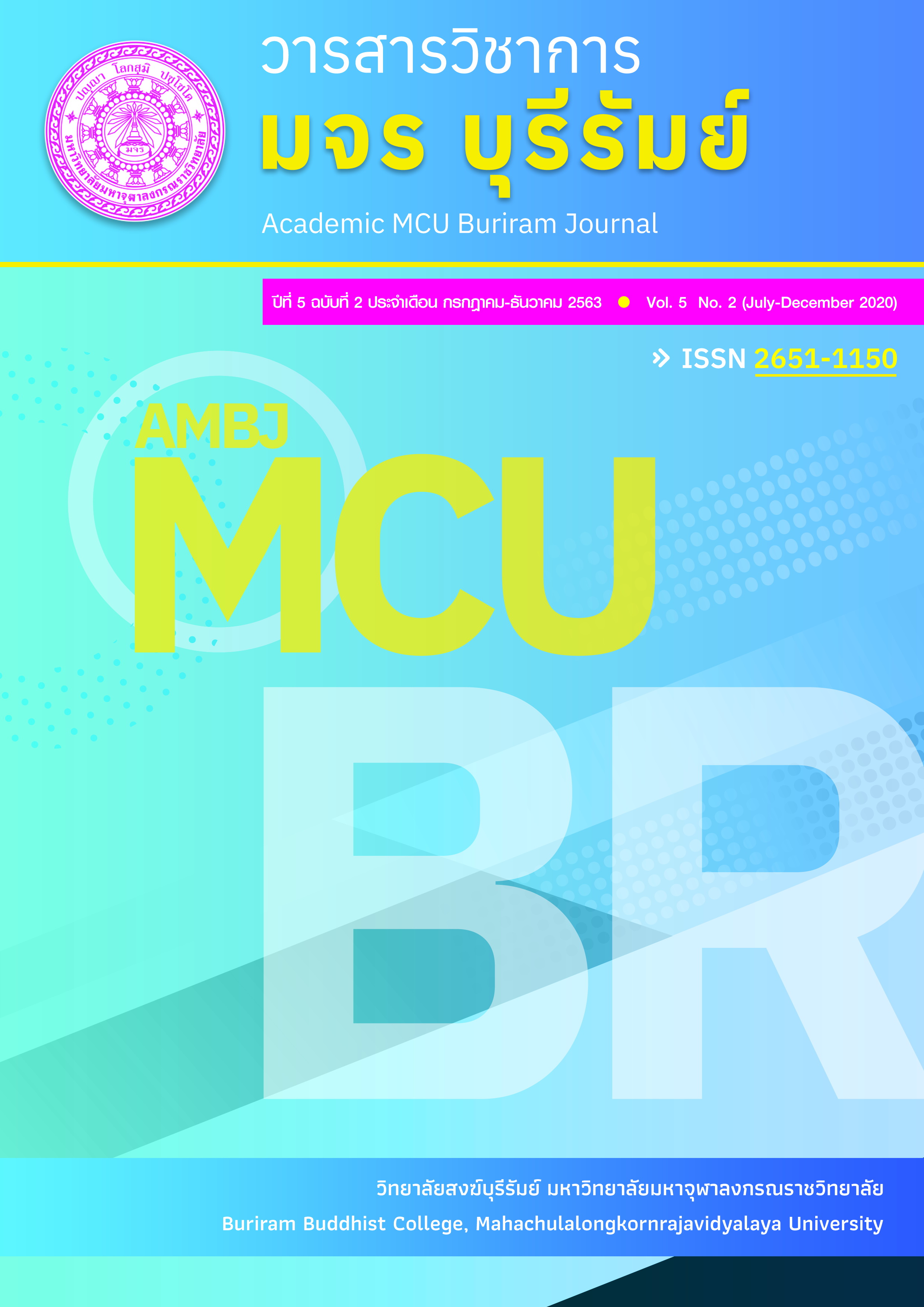KuruKaravata: The Model for Enhancing Teacher Personality by Principle Kuruthaniyadhamma
Keywords:
KuruKaravata, Model, Enhancing, Teacher Personality, KuruthaniyadhammaAbstract
This article aim to reflect the desirable personality of the teacher profession and the methods for enhancing teachers' personality through Buddhist principles called "Kuruthaniyadhamma" Teachers are one profession that many people look forward to because their main task is to promote full and effective education for children and young people. This makes the teacher a person who must have the characteristics suitable for teaching and learning to students. Teachers have to be teachers who are ready, skilled and know how to behave all the time, not just during working hours. But after working as a teacher does not disappear, so the character of a good teacher is so important.
It can be said that the principles that are suitable for promoting teacher personality That is, Kuruthaniyadhamma has 7 elements which are To be loved by the disciple, Having a stable mind is a good example for students both physically and verbally, Has a delightful personality Commendable in the base of experts, Knowing how to speak effectively Known to explain to the students to understand teach what is right, not distorted, Have patience to the words of the disciple that comes to affect, A profound statement Clarify matters that are complicated and difficult to understand easily, Failure to lead the disciple in an unreasonable way Does not lead in the way of calamity.
References
บุญส่ง หาญพานชิ. (2546). การพัฒนารูปแบบการบริหารจัดการความรู้ในสถาบันอุดมศึกษาไทย. วิทยานิพนธ์ครุศาสตรดุษฎีบัณฑิต. จุฬาลงกรณ์มหาวิทยาลัย.
เตือนใจ รักษาพงศ์. (2551). การพัฒนารูปแบบการจัดการความรู้เพื่อการบริหารงานวิชาการของสถานศึกษาขั้นพื้นฐานด้วยกระบวนการวิจัยเชิงปฏิบัติการแบบมีส่วนร่วม, วิทยานิพนธ์การศึกษาดุษฎีนิพนธ์. บัณฑิตวิทยาลัย: มหาวิทยาลัยบูรพา.
ธีรวัส บำเพ็ญบุญบารมี. (2563).วิธีการสอนพระพุทธศาสนา. www.gotoknow.org/posts/512714 (20 มิถุนายน 2563)
นรา ตรีธัญญา. (2558). การพัฒนารูปแบบการเรียนการสอนตามแนวพุทธศาสน์เพื่อเสริมสร้างคุณลักษณะอันพึงประสงค์ตามแนวปรัชญาของเศรษฐกิจพอเพียงสําหรับนักเรียนชั้นมัธยมศึกษาตอนปลาย, ปรัชญาดุษฎีบัณฑิต สาขาวิชาหลักสูตรและการสอน ภาควิชาหลักสูตรและวิธีสอน. บัณฑิตวิทยาลัย: มหาวิทยาลัยศิลปากร.
พระพรหมคุณาภรณ์ (ป.อ. ปยุตฺโต). (2550). ศิลปะศาสตร์แนวพุทธ. กรุงเทพฯ: พิมพ์สวย.
พุทธทาสภิกขุ. (2529). ธรรมสำหรับครู. พิมพ์ครั้งที่ 2. กรุงเทพฯ: โรงพิมพ์นิพพาน.
ยนต์ ชุ่มจิตร์. (2541). ความเป็นครู. พิมพ์ครั้งที่ 3. กรุงเทพฯ: โอเดียนสโตร์.
เยาวดี รางชัยกุล วิบูลย์ศรี. (2544). การประเมินโครงการ: แนวคิดและแนวปฏิบัติ. กรุงเทพมหานคร: จุฬาลงกรณ์มหาวิทยาลัย.รัตนวดี โชติกพนิช. (ม.ป.ป.). จริยธรรมและจรรยาบรรณในวิชาชีพครู. คณะศึกษาศาสตร์ มหาวิทยาลัยรามคำแหง.
วันทนีย์ แสนภักดี. (ม.ป.ป.). การพัฒนาบุคลิกภาพ. http://management.aru.ac.th (15 มิถุนายน 2563)
สำนักงานคณะกรรมการการศึกษาแห่งชาติ. (2538). แผนหลักการปฏิรูปการฝึกหัดครูพัฒนาครูและบุคลากรทางการศึกษา. กรุงเทพฯ: ฟันนี่พับบลิชชิ่ง.
อำนาจ อนันตชัย. (2543). คุณธรรมและจรรยาบรรณของข้าราชการ. วารสารพัฒนาชุมชน.(23 สิงหาคม 16).
Good, Carter V. (1973). Dictionary of Education. New York: Mc Graw Hill Book.
Keeves, J.P., & Alagumalai, S. (1998). Advances inmeasurement in science education. In B.J. Fraser & K. G. Tobin (Eds.). International handbook of science education Dordrecht: Kluw.
Downloads
Published
How to Cite
Issue
Section
License
ทัศนะและความคิดเห็นที่ปรากฏในบทความวารสารฉบับนี้ถือเป็นความรับผิดชอบของผู้เขียนบทความนั้น ไม่ถือเป็นทัศนะและความรับผิดชอบของบรรณาธิการ





